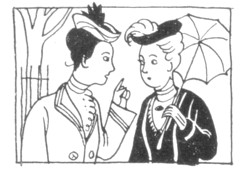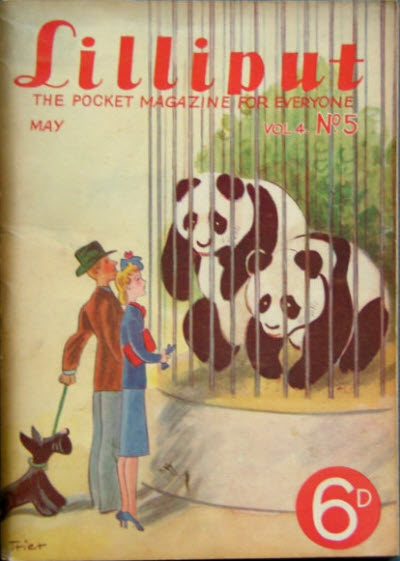HISTORY

By Frederick Karinthy
Crisis to You
THIS happened in Budapest. I first saw them on a tramcar. In 1913. The two women—good friends for years—were in the midst of an agitated conversation as I sat down near them.
“Yes,” said the dark one, “if it has a high waist-line the skirt must be accordion-pleated.”
“Well, I prefer a horizontally barred jacket with four buttons down the front,” the blonde. answered.
The next time was in 1914. I saw them walking along the Embankment. I remember the date well—it was the day of the battles at the Mazures lakes. News had come that morning that forty thousand Russians had been drowned.
“You are wrong, my dear,” the dark one said in a rather strained voice. “The open sleeves may be all right, but a soft belt is absolutely necessary. You’ll see when it’ ready how slim I look in it.”
“Mine has a simple red ribbon at the throat,” said her friend, “and,
of course, one needs special stockings for that.”
The news of the German surrender, meaning the end of the war, arrived via Paris on November 18. One hour before the extras were out I went out into the city. They were coming towards me and my ear caught the word “Paris.” I thought perhaps they had some inside information.
“Don’t say that,” the dark one objected; “it’s in the Paris papers already.”
“Impossible,” the blonde retorted. “You can’t wear a straw hat in winter, even if it’s in a hundred Paris papers. Perhaps a straw brim could be used, but naturally only with a black moirée ribbon.”
There was a dense crowd to greet the President of our new Republic. The two women were there as well. They seemed excited.
“You’re mad,” the dark one panted. “You must have been driven crazy by the extremists.”
446
LILLIPUT
“Yes, yes and yes,” the blonde said feverishly, “the skirt should be above the knee and my new salmon pink crepe gown will follow the fashion. You’ll soon see that I’m right.”
The mob rushed along the boulevards, yelling and cheering the Soviet. It was the time of the short communist reign in Hungary. Rifles spat, machine-guns rattled. Somebody shouted: “Let’s get out of this and go home!” The two women dashed past me.
“I’m off to my dressmaker,” the dark one shouted. “I’ll come tomorrow and bring it along.”
“Don’t forget the pattern!” screamed the blonde as a bullet
grazed her hat.
It was a long time before I met them again. They were walking in front of me in a fashionable shopping street, arm in arm, in a quiet, peaceful way.
“Well, perhaps you were right,” said the dark one. “If the skirt is accordion-pleated, the waist-line must not be high.”
“Yes,” the blonde one said, “I don’t think the horizontally barred jacket is fashionable any more. It should be short and have no buttons. The belt should not be red, but. . .”
Unfortunately I didn’t find out what colour the belt should be. Never mind, we’ll find out in the next world war.

447
